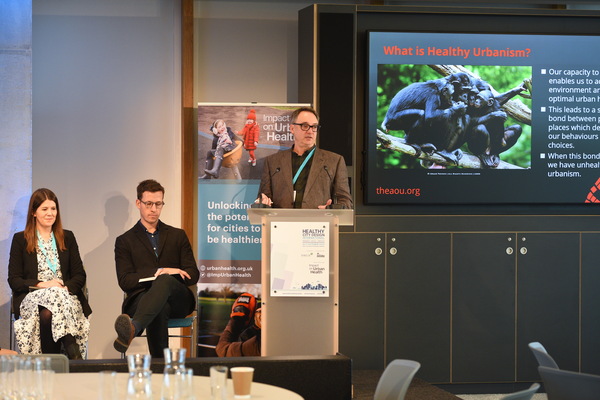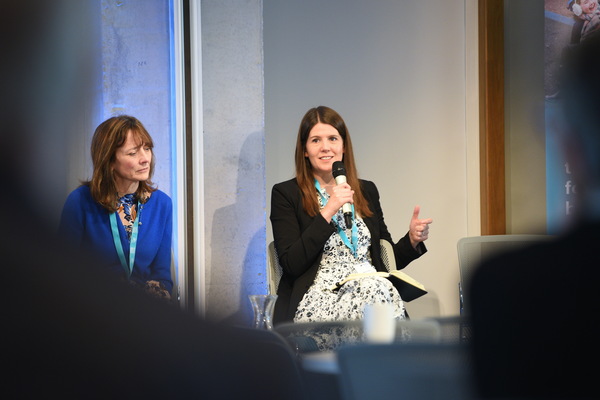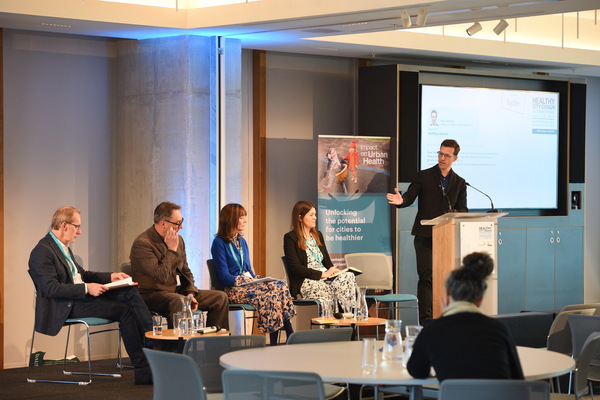Here at the Academy of Urbanism we welcome collaboration with other organisations and, for the second year, have partnered with Salus who organise the Healthy City Design Congress.
A global gathering of almost 300 urban health professionals from academia, policy and design in both the public and private sectors came together from 16-17 October at Liverpool’s Royal College of Physicians. “From the moment Prof Sir Michael Marmot informed delegates that if you remove London from GDP figures, the UK’s national income is the same as Mississippi, the poorest US state, the tone was set for them to grapple with the theme of “Urban renewal and health equity,” said Marc Sansom, Managing Director of SALUS Global Knowledge Exchange.


A panel on Citizen Participation and Social Capital was chaired by Michele Grant, (AoU Vice Chair). “It was engagement with citizens and their empowerment that came back as the most important dimension to achieving healthy cities” she observed, adding “I was fascinated by the case study about growing food in Liverpool and how that can be made to work on a commercial basis while educating young people about food and feeding local people in need.”
During the second day, the AoU explored the topic of ‘Healthy Urbanism – from the what to the how.’ Harry who chaired the session felt it was a lively, absorbing debate and it certainly attracted a large audience. Michele joined the panel along with Philip Jackson and Heather Claridge (both fellow AoU directors). Marc Sansom considered it to be “one of the highlights of the congress, that Prof Marmot asked the big questions and the AoU’s interactive panel helped delegates to think about how to answer them.”
Philip found “the audience discussion particularly interesting - with many people working in health and social organisations, rather than in ‘urbanism’ – and some working very much at grassroots level, where communities are challenged and struggling with top-down, short-term funding and short-sighted governance policies. I mentioned the quality being achieved in Clonakilty in Ireland, and in Sheffield where community-based initiatives have been effective and proactive.”
It was notable that the audience asked about the ingredients, the main players, how to create the right conditions, the decision-making and funding processes. Key points included: good leadership, professional commitment and coordination, and the ability to build trust, confidence, and evidence through small-scale interventions.
The choice of Liverpool as host city was applauded by Heather Claridge: “It proved to be an inspiring setting. Coming from my hometown, Glasgow, I was struck by the similarities in the challenges and aspirations related to achieving ‘urban renewal and health equity,’ the overarching theme of this year’s conference. Topics ranging from repurposing disused department stores to community-led green infrastructure to the concept of 20-minute neighbourhoods were explored during the two-day programme, creating a rich tapestry of learning opportunities.”
Michele added that “the conference had a strong research focus including the presentation of some excellent – if challenging – context to the state of the UK’s health today and we were left in no doubt as to the link between health and poverty.” Philip noted that many of the themes in his presentation such as safety, inclusivity, caring, kindness and ensuring people feel valued “were also being made by my fellow Academicians.” He gave examples of places where these values are a focus including Trieste (AoU European City of the Year 2023), Leipzig (AoU European City of the Year 2019) as well as ‘The Greater Galway Charter for Sustainable Urbanism’ and wondered if the biggest challenge is to create evidence based data in terms of social indicators and outcomes showing that quality and health are interrelated.
So, what were the key takeaways?
- A general recognition that our current system isn’t working and rather than curing ill health we should prevent it in the first place. The built environment is fundamental to this.
- The UK Government’s aim is for ‘health in all policies’ which means we will see more focus on health in planning (both NPPF and Local Plans)
- Housing is fundamental and is seen as the solution and upcoming legislation may influence the quality of homes.
- There are global trillions of funds available for impact investing in urban renewal. Central and local policy makers, developers and urbanists have an opportunity to direct this capital towards healthier outcomes.
All the directors look forward to further AoU collaboration with the Salus Healthy City Design Congress to continue promoting good urbanism and the enablement of thriving communities.





